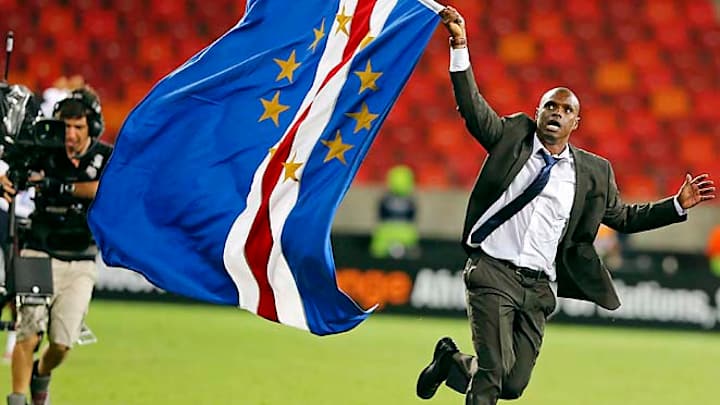Tiny Cape Verde is Africa Cup of Nations' Cinderella story


When Cape Verde coach Lucio Antunes entered the press conference room in Port Elizabeth on Sunday, he found his team had gotten there before him. They were lined up on the dais behind the desk, bouncing up and down in glee as a African Football Confederation official sat sheepishly in the foreground, aware he had formalities to complete but unwilling to interrupt the jubilation.
Defender Gege, wearing his shirt back to front, leapt on a chair and carried on dancing. Antunes, at 46 and a little too old for that sort of thing, initially looked a little uncomfortable but then, after some awkward shuffling, draped himself in the flag and began directing the celebrations. Usually, he directs planes.
For Cape Verde even to be at the Cup of Nations is an underdog story for the ages. For it to reach the last eight at the first attempt is extraordinary, all the more so as it's the smallest nation ever to qualify for the finals. If its population of 501,000 moved en masse to a city in the U.S., it would be only the 34th biggest, slightly smaller than Albuquerque and Tucson, and just a little larger than Fresno and Sacramento. Its coach isn't even full-time, Antunes working as an air-traffic controller in the capital, Praia.
Yet Cape Verde has a proud football heritage. Nani, Patrick Vieira and Henrik Larsson all have enough Cape Verdean ancestry to have played for the archipelago. Even Cristiano Ronaldo has a Cape Verdean great-grandparent. There has been dark talk from outsiders of Cape Verde scouring the globe for those who qualify as Cape Verdean through a grandparent or who might be prepared to accept a passport of convenience.
WAHL: Kalou eyes Ivory Coast's missing title
While there has been a clear effort to persuade Cape Verdeans living abroad to recognize their roots, it has been nothing like as cynical as the program Equatorial Guinea embarked upon before last year's tournament, when only three of the squad were born in the country. Of the 23 in Cape Verde's squad, only five -- Fernando Varela, Guy Ramos, Marco Santos, David Silva and Carlitos (a cousin of Nani) -- were born overseas. This is a home-grown triumph and, even more remarkably, it has been achieved with a homegrown coach.
Where the default reaction of most Africa nations is to turn to a European coach -- even impoverished Niger, which needed a fundraising drive last year just to get to Gabon, have now found the money to bring in German Gernot Rohr -- Cape Verde in 2010 turned to Antunes, who had success with the national under-21 side, winning the Lusophone Games in Lisbon in 2007, before working as assistant to his predecessor, Joao de Deus, and leading the Cape Verdean club side Academico do Sal. In the buildup to the tournament, he spent a week shadowing Jose Mourinho.
Antunes was understandably overjoyed, breaking off in the middle of the press conference to sing a snatch of the Cape Verdean song, "The Biography of a Crioulo."
"It's a traditional song," he said. "I dedicate it to all the people at home. We came here with the determination to win this game, and from the first minute we worked. It was the dedication of the players. Our objective at this tournament has been achieved. We wanted to reach the quarterfinals."
They did it in impossible dramatic fashion. The first week of the Africa Cup of Nations may have been drab, but group stages often are. Tournaments, ultimately, are judged on their decisive games, and the final round of Group A matches provided astonishing tension. With nine minutes to go, Cape Verde trailed 1-0 to a Nando own-goal and was facing elimination. But a weak punch from Lama allowed Fernando Varela to nod the equalizer and then, in the first minute of injury time, the keeper tamely parried a shot into the path of Heldon Nhuck, who crashed the ball past him to seal Cape Verde's progress and eliminate Morocco.
"We knew what was happening in the other match between South Africa and Morocco, and that's why I told the team to attack until the end, and it paid off," Antunes said.
Turkish club says it's in talks with Drogba
It's been his side's defense, though, that has been its real strength, conceding only that own goal and Youssef El Arabi's late equalizer for Morocco in the three group matches so far. Toni Varela sits deep in midfield, just in front of Fernando Varela and Nando, with Babanco and Marco Soares shuttling up and down beside him to provide support and link with the front three.
Julio Tavares stays high as a central striker, with Platini and Ryan Mendes drifting in from the flanks, playing partly as wingers and partly as more central creators. It's not a complicated system, but it is effective. Cape Verde has already achieved its objective and will be treated as heroes at home whatever happens. Any further progress is a bonus, it is a decided underdog against Ghana on Saturday, but Antunes will be hoping he can extend his break from the control tower for a few days yet.
Jurgen Klinsmann, helicopter pilot
